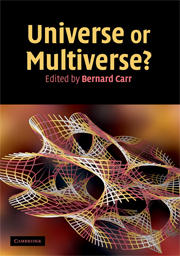You've probably heard the old chestnut about the sales of a popular science book being halved by each equation it contains - there's probably an element of truth in it, but it has left a bit of a void between popular science and "real" science titles, and it's a real pity. The more advanced physics fan may well find that they end up reading the same lengthy description of a black hole in most of the books they read, when in fact they can already visualise the graph of the equations involved and see the line curving towards c and off to infinity.
The void is slowly being filled though. Popular science is slowly getting adventurous with maths, as Cox and Foreshaw's excellent why does E=mc2 (and why should we care?) shows. The recreational maths field is quietly, but hugely popular, and the usually dry advanced material is becoming more accessible. Universe or Multiverse belongs with the latter.
 This thumping big 500 page paperback consists of essays from a wide span of big names in cosmology, theoretical physics, mathematics, philosophy and theology. It is the result of an eponymous Stanford conference in 2003, concerning the controversial concept of a Multiverse - the existence of parallel universes to the observable one, in one form or another.
This thumping big 500 page paperback consists of essays from a wide span of big names in cosmology, theoretical physics, mathematics, philosophy and theology. It is the result of an eponymous Stanford conference in 2003, concerning the controversial concept of a Multiverse - the existence of parallel universes to the observable one, in one form or another.
It's controversial for many reasons - firstly, no one is really sure it even constitutes science. Parts of the idea are clearly non-falsifiable, others are recursively predictive to the point of reductio ad absurdum, but the main root of the discussion is the Anthropic Principle in all its guises.
There's nothing wrong with arguing from an anthropic viewpoint, as Frank Hoyle so gloriously demonstrated, but it's not evidence in the proper scientific sense. If does form the majority of the circumstantial evidence for Multiverse theory however, and it certainly gets put through the wringer by all parties concerned.
The maths is certainly not avoided, but lightly sprinkled given the heavy influence of philosophy on the ideas discussed. You can skim through the highly detailed discussions on subtle points concerning the cosmological constant for example, but the calibre of the writing combined with the magnitude of the subject matter leaves you feeling like you just need a refresher course with a popular science cosmology title before you go back for more...
A superb book all in all, and worth the £29.99 price tag for the contributors list alone.
Universe or Multiverse?
Ed. Bernard Carr
Cambridge University Press
ISBN: 9780521140690
The void is slowly being filled though. Popular science is slowly getting adventurous with maths, as Cox and Foreshaw's excellent why does E=mc2 (and why should we care?) shows. The recreational maths field is quietly, but hugely popular, and the usually dry advanced material is becoming more accessible. Universe or Multiverse belongs with the latter.
 This thumping big 500 page paperback consists of essays from a wide span of big names in cosmology, theoretical physics, mathematics, philosophy and theology. It is the result of an eponymous Stanford conference in 2003, concerning the controversial concept of a Multiverse - the existence of parallel universes to the observable one, in one form or another.
This thumping big 500 page paperback consists of essays from a wide span of big names in cosmology, theoretical physics, mathematics, philosophy and theology. It is the result of an eponymous Stanford conference in 2003, concerning the controversial concept of a Multiverse - the existence of parallel universes to the observable one, in one form or another.It's controversial for many reasons - firstly, no one is really sure it even constitutes science. Parts of the idea are clearly non-falsifiable, others are recursively predictive to the point of reductio ad absurdum, but the main root of the discussion is the Anthropic Principle in all its guises.
There's nothing wrong with arguing from an anthropic viewpoint, as Frank Hoyle so gloriously demonstrated, but it's not evidence in the proper scientific sense. If does form the majority of the circumstantial evidence for Multiverse theory however, and it certainly gets put through the wringer by all parties concerned.
The maths is certainly not avoided, but lightly sprinkled given the heavy influence of philosophy on the ideas discussed. You can skim through the highly detailed discussions on subtle points concerning the cosmological constant for example, but the calibre of the writing combined with the magnitude of the subject matter leaves you feeling like you just need a refresher course with a popular science cosmology title before you go back for more...
A superb book all in all, and worth the £29.99 price tag for the contributors list alone.
Universe or Multiverse?
Ed. Bernard Carr
Cambridge University Press
ISBN: 9780521140690

No comments:
Post a Comment